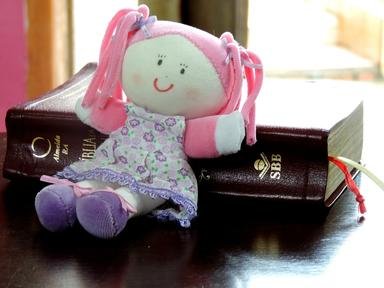Quiz Answer Key and Fun Facts
1. According to Genesis, chapter 1, verse 2, what was the (Holy) Spirit of God doing?
2. According to John, chapter 1, the Word was *with* God and the Word *was* God. Who is the Word?
3. In what prophetic book can you find this verse, quoted from the New American Standard Bible? "And now the Lord God has sent Me, and His Spirit."
4. The Son was baptized, and the Father stated that He was His Son. Meanwhile, the Holy Spirit appeared on the Son as what animal? (Matthew, chapter 3, verses 16-17)
5. In John, chapter 6, verse 46, whom did Jesus say nobody (except Jesus Himself) has ever seen?
6. Matthew, chapter 12, verse 50, New American Standard Bible:
Jesus said, "For whoever does the will of My __ who is in heaven, he is My brother and sister and mother."
What is/are the missing word(s)?
7. According to Luke, chapter 24, verse 49, in the New Living Translation, Jesus said,
"And now I will send the Holy Spirit, just as my Father promised. But stay here in the city until the Holy Spirit comes and fills you with power from heaven."
Who did He say this to?
8. A quote from the New Testament, according to the King James Version states,
"For there are three that bear record in heaven, the Father, the Word, and the Holy Ghost: and these three are one."
In which book of the Bible can you find this verse?
9. Based on John, chapter 5, how did the followers of Judaism view Jesus when He called God His own Father?
10. According to Matthew, chapter 28, verse 19, Jesus commanded His followers to preach the gospel everywhere and to baptize in whose name?
Source: Author
Ceduh
This quiz was reviewed by FunTrivia editor
NatalieW before going online.
Any errors found in FunTrivia content are routinely corrected through our feedback system.
